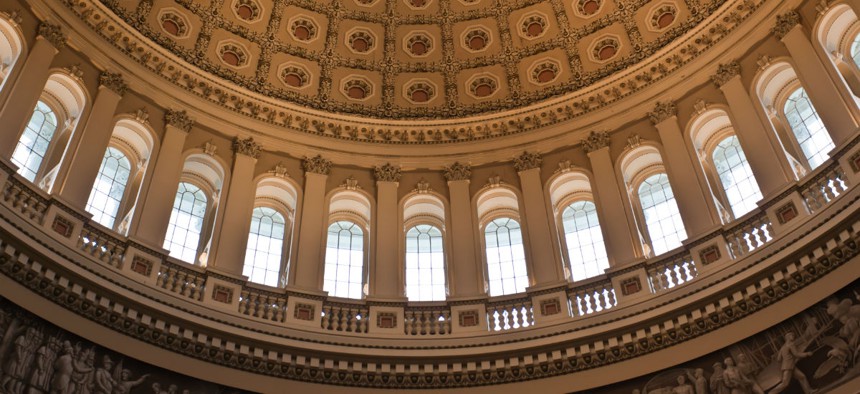Agency Funding in Limbo as House and Senate Forge Different Paths
Partisan rancor in lower chamber obscures progress in upper.
Funding federal agencies for fiscal 2017 should be easier than most years, as a two-year budget agreement has already set the top-line spending totals.
In Congress, of course, nothing really comes that easy.
When the Energy and Water Appropriations Act failed on the House floor last week, it marked the latest clash in months of disagreement over how to proceed with the line-by-line agency funding bills to meet the overall spending cap. The energy and water bill ended up failing by a large margin after nearly all Democrats and many Republicans voted against it.
Democrats opposed the measure from the start due to environmental policy riders they found objectionable, while some Republicans decided they could not support it after lawmakers voted to include a controversial measure to ensure federal contractors could not discriminate against lesbian, gay, bisexual and transgender employees. That vote occurred just one week after chaos erupted on the House floor after the same amendment was offered to the veterans affairs spending bill. The amendment initially had enough support to pass, but Republican leadership left the vote open after the allotted time had expired to allow members to switch their votes.
The amendment ultimately failed 212-213, and the larger bill passed mostly along party lines.
While the House has gotten bogged down by what both parties are referring to as ideological and “poison” policy provisions -- which crop up every year in the funding process -- the Senate has moved its spending bills forward with relative ease.
The upper chamber last month approved a package including funding for the departments of Veterans Affairs, Transportation and Housing and Urban Development with 89 votes. It also passed its own energy and water bill with 90 votes. The Senate Appropriations Committee has approved nine of the 12 appropriations measures required each year, all with unanimous support.
After approving homeland security funding last week, Sen. John Hoeven, R-N.D., who chairs the subcommittee for that bill, praised the “joint efforts” of both parties to move the legislation forward.
“We incorporated submissions from 90 senators on both sides of the aisle on nearly every facet of the department’s operations,” Hoeven said, “and now I believe we have good, bipartisan legislation for the American people.”
Chris Gallegos, a spokesman for Appropriations Committee Chairman Thad Cochran, R-Miss., said this year’s progress follows the work the committee did last year in passing all 12 spending bills individually. A commitment from Senate leadership to debate each fiscal 2017 bill on the floor has helped advance the measures, he added.
“The Appropriations Committee embarked on an accelerated schedule to review the budget, hold oversight hearings and write bills,” Gallegos said. “The chairman is pleased with committee and Senate progress on FY2017 bills, and will continue to work toward finding the best ways to get these bills to the president.”
The House has only approved the VA spending bill, while the chamber's Appropriations Committee has approved seven measures. While many of those won unanimous support by voice vote, Democrats made clear they would not support the bills on the floor without some changes.
“We cannot support this bill given the ideological riders currently included in the committee product,” the committee’s ranking member, Rep. Nita Lowey, D-N.Y., and Rep. Marcy Kaptur, D-Ohio, wrote in the report on the initial energy and water bill, though they did not stand in the way of its passage.
On the agriculture bill, which the committee approved in April, Democrats were even more direct in their opposition.
“The bill has too many provisions that would harm the health and safety of Americans by underfunding our food safety regulators and failing to adequately address nutrition and farm worker protections,” Rep. Rosa DeLauro, D-Conn., wrote in the report on that bill. Democrats did not lend their support to that measure.
Matt Dennis, a spokesman for Lowey, predicted Republicans would ultimately need Democratic support to stave off a continuing resolution or funding lapse. To account for defectors in their own party Republicans have relied on the minority to avoid a shutdown for each of the last several years.
“If Republicans want to pass any appropriations laws,” Dennis said, “they will need Democrats to support to that.”
He added: “When we get to the end game, any riders they end up pushing through the House…are going to have to disappear.”
For the time being, however, he does not expect the ideological fight to subside. The generally non-controversial legislative branch funding measure, which the committee approved unanimously in May and the full House will consider next, is also primed for a fight, this time over semantics. A provision of the bill would change the search term “illegal alien” in the Library of Congress to a less divisive phrase, but the two parties are at odds over the alteration.
It is now unclear how the House will proceed, but both chambers must pass spending bills and get them to President Obama's desk by Sept. 30 to avoid a stopgap measure or shutdown.
For now, the Senate will continue to focus on its own legislation.
“Cochran is careful not to advise the House how to do its work,” a Senate Appropriations Committee aide said. “His view is to let each house of Congress work its will and then get together to work things out.”








